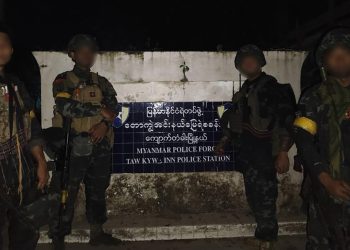NAYPYITAW — The Ministry of Labor, Immigration and Population will investigate allegations that more than 3,000 residents in southern Rakhine State’s Ramree Township issued National Registration Cards (NRCs) as ethnic Kaman are actually Rohingya.
“The Kaman National Progressive Party [KNPP] has filed a complaint,” Labor, Immigration and Population Minister U Thein Swe told reporters on the sidelines of a workshop of Myanmar’s labor market in Naypyitaw on Thursday.
“Our ministry has carefully scrutinized it, and we will scrutinize it again. And we will act as necessary in line with the law based on our findings,” he said.
The KNPP lodged a complaint with the President’s Office and State Counselor’s Office earlier this month alleging that more than 3,000 NRCs designating the holders as ethnic Kaman were wrongly issued to Rohingya in Ramree Township’s Kyauk Ni Maw Village.
U Thein Swe insisted that the ministry’s Immigration Department was issuing NRCs, which are commonly known as pink cards and grant full citizenship, in line with the Citizenship Law.
Though ethnic Kaman in Kyauk Ni Maw number just over 200, the Immigration Department has issued 3,306 NRCs designating the holders as Kaman in the area, according to KNPP Secretary U Tin Hlaing Win.
The KNPP claimed that some people, in an apparent reference to Rohingya, have been trying to gain citizenship by claiming to be Kaman in order to be able to vote in elections.
“The party has been pointing out those who are not Kaman since the campaign season of the 2010 general election. We assume that we are responsible if someone takes advantage of our Kaman ethnicity for political gains,” said U Tin Hlaing Win.
The party secretary said the KNPP was not trying to prevent Rohingya from gaining citizenship. But he said issuing NRC’s that identify the holder as Kaman to people who have a different language and culture harms the Kaman community.
U Aung Kyaw Zan, a community elder in Kyauk Ni Maw, said the more than 3,000 people issued the NRCs as Kaman are in fact Kaman, speak their language and practice their customs.
“We share the same culture. What do they want to say? We speak both Arakanese and Burmese, we go to [public] schools, and we have family members and relatives who are civil servants,” he said.
On Sept 10, the Upper House of Parliament blocked a proposal by ethnic Rakhine lawmaker Daw Htoot May to review the NRCs in dispute.
On Thursday, lawmaker U Than Maung, who represents Ramree Township in the national legislature, urged the Rakhine State Parliament to review the cards instead.
The Kaman minority is one of 135 officially recognized ethnic groups in Myanmar and one of the seven ethnic subgroups in Rakhine State. Unlike the Buddhist Rakhine, the Kaman are Muslim.
They have been living in Rakhine for centuries. During the Arakan Kingdom, the Kaman served as royal archers, but the profession vanished when the kingdom fell to the Burmese Konbaung Dynasty in 1784. Nowadays, there are about 45,000 ethnic Kaman Muslims across the country.
Translated from Burmese by Thet Ko Ko.

















